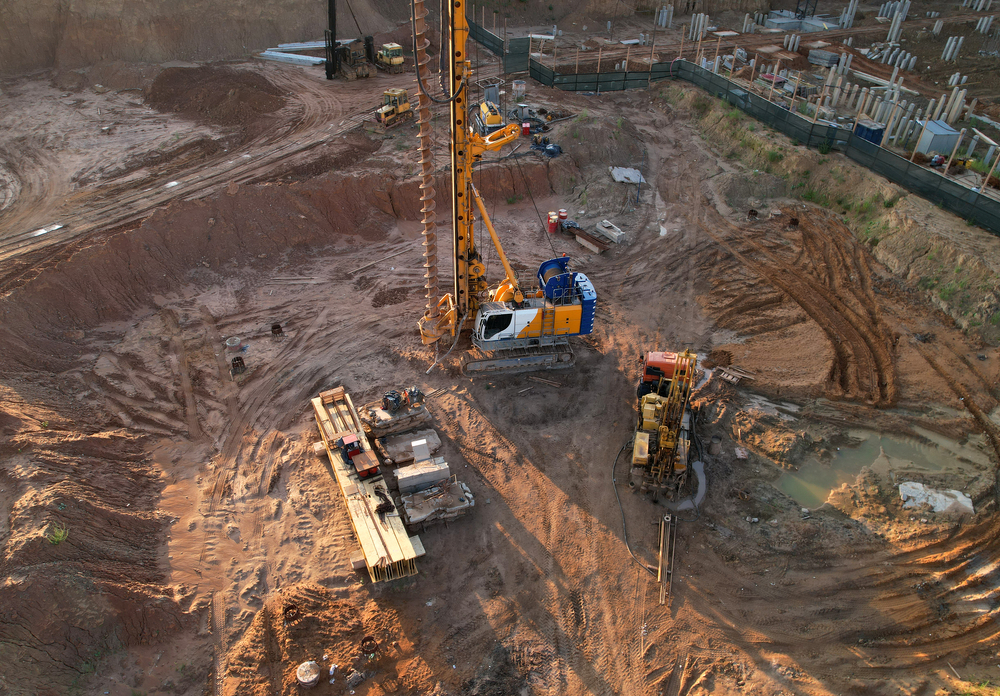How Geotheta can Save You Time, Stress, and Money.
How Geotheta can Save You Time, Stress, and Money.
Blog Article
4 Simple Techniques For Geotheta
Table of ContentsThe Ultimate Guide To GeothetaGetting My Geotheta To WorkSome Of GeothetaThe 6-Minute Rule for GeothetaThe Single Strategy To Use For Geotheta

They perform site investigations, accumulate samples, do research laboratory tests, and evaluate information to examine the suitability of the ground for building jobs - Consulting Engineers. Based on their findings, geotechnical engineers supply recommendations for foundation style, slope stability, keeping structures, and reduction of geotechnical risks. They work together with other professionals, such as designers, architectural engineers, and building and construction groups, to make certain that geotechnical factors to consider are integrated right into the overall task style and execution
By examining the behavior and buildings of soil and rock, they can determine prospective geotechnical dangers such as landslides, dirt settlement, or slope instability. Their know-how assists protect against failures or crashes that can jeopardize lives and residential or commercial property. Below are some in-depth tasks and duties of a geotechnical designer: Website Examination: Geotechnical designers conduct site examinations to gather data on subsurface problems.
They analyze the data to understand the buildings and habits of the dirt and rock, including their strength, permeability, compaction characteristics, and groundwater problems. Geotechnical Analysis and Layout: Geotechnical designers evaluate the information gathered throughout site investigations to analyze the stability and suitability of the site for building and construction jobs. They carry out geotechnical calculations and modeling to review factors such as birthing ability, settlement, incline stability, side earth stress, and groundwater flow.
3 Simple Techniques For Geotheta
Foundation Layout: Geotechnical engineers play an important function in designing foundations that can safely sustain the intended structure. They evaluate the dirt conditions and tons needs to figure out the proper structure type, such as shallow foundations (e.g., grounds), deep foundations (e.g (https://triberr.com/geotheta)., stacks), or specialized methods like soil improvement. They consider elements such as settlement limitations, birthing capability, and soil-structure communication to develop ideal structure styles
They evaluate building plans, display website activities, and perform field inspections to validate that the style suggestions are complied with. If unexpected geotechnical issues develop, they evaluate the scenario and offer suggestions for removal or adjustments to the design. Threat Assessment and Mitigation: Geotechnical engineers examine geotechnical dangers and dangers connected with the project website, such as landslides, liquefaction, or soil disintegration.

Partnership and Communication: Geotechnical designers function very closely with other specialists associated with a project, such as engineers, architectural designers, and building and construction groups. Efficient communication and cooperation are important to incorporate geotechnical factors to consider right into the overall task design and building and construction process. Geotechnical engineers offer technological knowledge, solution queries, and make certain that geotechnical requirements are satisfied.
Getting The Geotheta To Work
Right here are some sorts of geotechnical designers: Structure Engineer: Structure engineers concentrate on developing and evaluating foundations for frameworks. They examine the dirt problems, tons needs, and website attributes to determine the most suitable foundation kind and design, such as superficial foundations, deep structures, or specialized techniques like stack foundations.
They assess the elements influencing slope security, such as soil properties, groundwater conditions, and incline geometry, and create strategies to avoid incline failings and reduce threats. Quake Designer: Earthquake designers concentrate on analyzing and designing structures to hold up against seismic forces. They examine the seismic hazard of a website, evaluate soil liquefaction potential, and establish seismic layout standards to ensure the safety and strength of structures during earthquakes.
They do field testing, accumulate examples, and evaluate the accumulated data to identify the soil homes, geologic formations, and groundwater problems at a site. Geotechnical Instrumentation Engineer: Geotechnical instrumentation engineers concentrate on surveillance and determining the habits of dirt, rock, and frameworks. They my website set up and keep instrumentation systems that check elements such as soil settlement, groundwater degrees, slope activities, and architectural variations to assess performance and supply very early warnings of possible issues.
The Greatest Guide To Geotheta
They carry out examinations such as triaxial tests, combination examinations, straight shear examinations, and permeability tests to collect information for geotechnical analysis and layout. Geosynthetics Engineer: Geosynthetics designers focus on the layout and application of geosynthetic products, such as geotextiles, geogrids, and geomembranes. They use these products to enhance soil stability, enhance inclines, provide water drainage solutions, and control disintegration.
They often tend to be investigative people, which implies they're intellectual, introspective, and analytical. They are interested, methodical, sensible, logical, and sensible. Some of them are additionally social, meaning they're kind, charitable, cooperative, patient, caring, helpful, compassionate, tactful, and friendly - Geo Tech Engineer.
In the office setting, geotechnical designers utilize specialized software program tools to execute computations, create layouts, and assess information. They prepare reports, evaluation job specifications, interact with customers and staff member, and coordinate project tasks. The office setup provides a favorable environment for research study, analysis, and cooperation with other specialists associated with the job.
The smart Trick of Geotheta That Nobody is Discussing
They regularly go to job sites to conduct site investigations, analyze geotechnical problems, and collect information for analysis. These sees include traveling to various locations, sometimes in remote or tough terrains. Geotechnical designers may execute dirt sampling, conduct tests, and screen building and construction tasks to make certain that the geotechnical aspects of the job are being executed correctly.
Geotechnical designers additionally work in specialized geotechnical laboratories. Geotechnical laboratory engineers work extensively in these atmospheres, handling testing devices, operating instruments, and taping information.
Report this page